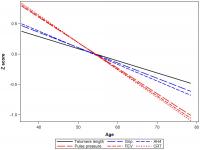Telomeres are repeating sequences of nucleic acids that cap the ends of chromosomes in the cell nucleus and stop actual gene-coding DNA from being chopped off when a cell divides. The mechanisms of DNA replication require extra leg room at the ends of the strand, a trailing sequence that is not copied over to the new strand under assembly - and the primary role of telomeres is to be the part that is dropped on the floor. A little of their length is thus lost with every cell division. This shortening acts as a clock to count cell divisions, and cells with very short telomeres stop replicating - they either enter cellular senescence (which ideally then causes the immune system to destroy them) or destroy themselves directly via programmed cell death mechanisms.
Telomere length is more dynamic than this simple picture, however. In some cell populations, such as the various types of stem cell that maintain tissues and produce new cells to replace those lost or damaged, an enzyme called telomerase continually lengthens telomeres so as to allow a cell lineage to continue dividing indefinitely.
Ordinary, non-stem cell populations exhibit a range of telomere lengths, some short, some long. You might imagine that a population of cells replenished more frequently or recently by stem cells will have longer telomeres on average. A population that is receiving less support might have shorter telomeres. Researchers have shown that a higher proportion of short telomeres in white blood cells correlates well with ill health or stress, and somewhat correlates with age. Some more complex measures of telomere length, a step above just taking the average, have been shown to correlate well with age, however, and other techniques do a fair job of predicting future life expectancy in laboratory animals.
A few years back a brace of startup biotech companies were aiming to address aspects of aging by lengthening telomeres through the use of telomerase. None of that went anywhere, unfortunately, but it's possible that they were just too early - it is frequently the case that all of the first batch of companies in a new area of biotechnology fail. It's a tough business to be in. I was a skeptic at the time regarding their potential for success based on my expectation that telomere length will prove not to be a root cause of aging.
Nonetheless, researchers are demonstrating extension of life in mice through telomerase these days, but it is as yet unknown as to exactly why this works. Perhaps it makes stem cells work harder to maintain tissues, perhaps there is just one critically limiting type of stem cell or tissue that benefits from more telomerase, or perhaps it involves other effects causes by increased levels of telomerase that have nothing to do with telomere length. It is worth bearing in mind that there is a considerable difference between natural levels of telomerase and the resulting telomere dynamics in mice and people, however. Telomerase therapy is probably not something you'd want to just up and try without the research community first obtaining a much greater understanding of why it works to extend life in mice.
Why? Well, the risk of telomere lengthening in humans is cancer. Any mechanism that globally, or possibly even narrowly, extends telomere length in people will raise the risk of suffering cancer. The whole system of telomere dynamics and cellular senescence is intimately tied to the processes of cancer suppression, while all cancers evolve ways of lengthening their telomeres to allow unlimited cell division. Boosting your telomerase levels looks a lot more risky to me than, say, undergoing first generation stem cell transplants.
There continues to be a lot of activity in telomere research and development. The present brace of telomere-related biotech startups are commercializing ways to measure telomere length rather than extend it. The products are tests that will at first add another measure to inform patients on the state of their health, then possibly act as an effective biomarker of biological age, and perhaps later prove useful in further research if it turns out that telomerase-based therapies can be beneficial in humans.
A growing number of researchers say telomere length is a critically important indicator of how old we really are, and of how many healthy years we may have in front of us. A new industry is sprouting up around the science of longevity, offering telomere testing to the public - and Nobel laureate Elizabeth Blackburn is a notable part of it. Her company, Telome Health, is set to launch a telomere test later this year, joining a handful of others that already do. Like a cholesterol or blood-pressure test, telomere testing could one day become standard in doctors' offices.And maybe in the future, we'll be able to slow or reverse the effects of aging -the vision of researchers searching for ways to boost telomerase, a goal already achieved in lab mice. Some are already marketing so-called "telomerase activators" to a public hungry for ways to stop the clock, although no such drugs have been approved. With so many companies rushing to come on board, "there's a lot of weird stuff going on out there," cautions Jerry W. Shay of the University of Texas Southwestern Medical Center, an expert on cell biology and telomere length.
Certainly you should be looking askance at any group that's selling herbal "telomerase activators" - it's the standard garbage from the supplement marketplace, and sadly that's the place that formerly funded companies doing original research often end up. It's hard to make money doing something useful in medical research, but depressingly easy to make money doing something useless in the supplement business. The traditional model here is to grab a little research that's somewhat relevant, scare up a bunch of Chinese herb extracts, and then hope that if you market the thing hard enough it'll overcome the obvious ineffectiveness and pointlessness. If you can buy out the shell of a company formerly doing research to try to profit from its one-time reputation, then all the better. Caveat emptor is the watchword, as ever.
So where do telomeres fit in the taxonomy of cause versus secondary effect in aging? Because of the dynamic nature of telomere length I'm given to think that it's a secondary effect: get sick and average telomere length in white blood cells shortens; get well and it lengthens again. This sounds very much like a system responding to circumstances, and those circumstances most likely include the general level of cellular damage, inflammation, and metabolic waste products - all of which grow with age. As for so many other similar questions about aging, the fastest and cheapest way to answer this question about telomere length is to implement the Strategies for Engineered Negligible Senescence (SENS): build the biotechnologies to repair these forms of damage and then see what happens to telomere length once its done. That is a good deal easier at this point than obtaining a full understanding of the aging of human biology.
None of the above precludes short telomeres from causing further damage or changes of their own, of course. Aging proceeds as a cascade of harmful effects as damage causes further damage and flailing biological systems cope badly with the new circumstances they find themselves in. Here is a recent article on how telomere length can impact gene expression and thus the operation of metabolism in a previously unsuspected way, for example:
Telomeres Affect Gene Expression
DUX4, a gene responsible for the genetic disease facioscapulohumeral muscular dystrophy (FSHD), is normally silenced because it sits next to a telomere - a protective DNA sequence that caps the ends of chromosomes, according to [a recent study]. But as telomeres shorten, as they do with age, DUX4 expression climbs, which may explain the late onset of FSHD. Another gene, called FRG2, which sits 100 kilobases away from the telomere, is also affected by telomere length."This was completely unexpected. We think that DUX4 and FRG2 are the tip of an iceberg." Due to shrinking telomeres, many genes might gradually become more active as we get older, which may be important for several diseases of old age. "This represents a very significant general advance in our understanding of how telomere shortening may affect human biology."
<br> <br>View the full article



















































